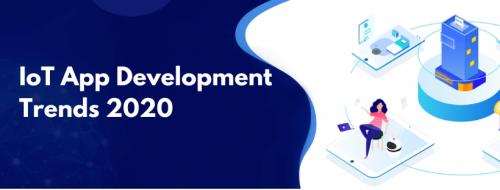Top 10 IoT App Development Trends in 2020

The evolving technologies
present us with some new gifts every year, and of the fantastic results of
continuous innovations is the Internet of Things or IoT. It is now a buzzword
to most of the industries, including healthcare, retail sector, and consumer
electronics. Internet of Things is a concept denoting an interconnection of
devices and the transfer of data through a network. Besides, IoT has stirred
the digital world and turned out to be the biggest player in the IoT
app development field.
Apps developed with IoT technology can trigger
the curiosity of your target audience. Look for an IoT app developer to create
a unique app for your business.
1. IoT app merged with AI, ML, and Big Data
Increasing uses of different devices mean more
data transmission. Surely, Big Data and Artificial Intelligence play a major
role in processing the high volume of data. Besides, Machine Learning is
another thriving technology to enable automation in different aspects of our
lives.
Moreover, combined with IoT, Machine Learning
and AI can reshape the human-machine interaction systems. A thoughtful blend of
IoT and these data-driven technologies result in the automation of daily tasks.
We can simplify our work and receive accurate data while providing services to
our customers. For instance, these automated processes are important for the product
manufacturing industry.
Create your IoT mobile app to make the best
decision with the help of data analytics. Thus, you can make your branding and
marketing campaign more effective.
2. IoT app- Block chain will play a role
Block chain technology mainly helps in making
safe digital transactions without the presence of intermediaries. With the
increasing use of interconnected and online devices, more data on the cloud has
the risk of hacking. Block chain can increase cyber security level for IoT
gadgets, and hence, you can develop customers’ trust for your business due to
the promising data security.
Besides, we can find decentralized and smart
infrastructure in governmental and financial institutions. Lots of emerging
companies are relying on IOTA ledger for transactions between IoT-connected
devices and for creating modules without SaaS costs.
Wait and see how the monolithic and centralized
computer models in micro services are allocated to decentralized devices.
Moreover, in the future, IoT will find its value in different fields, including
finance, health, and transactions.
3. Cloud computing going to be replaced with edge computing
We will find a big change. For the past few
years, we had been highly reliant on the cloud technology to store data for IoT
devices. However, nowadays, IoT application developers have started realizing
the value of analyzing, storing, and calculating data to some limit.
Besides, rather than transferring the IoT
device data to the modern cloud platform, developers send the data first to
some local devices, present at the network edge. The local device is capable of
filtering and measuring data before sending it to the cloud to reduce network
traffic. Thus, this edge computing approach helps in managing data, reducing
cloud dependency, and minimizing latency.
Due to the local data collection and data
processing trends, the IoT mobile app consumes low bandwidth. When there is no
cloud connectivity, the app will continue performing its function.
Consequently, the adoption of IoT has paved the way of innovation in the
computing world. The reducing use of cloud also results in better security
standards.
4. IoT to make energy consumption more sustainable
The modern age has already predicted the impact
of climatic change. It is the right time to think of the best solution to make
water and air cleaner. Apps powered the IoT will promote sustainable energy
usage.
In some commercial sectors, we can find
innovative water treatment systems to purify the water to make it drinkable.
But, we need to wait for some more years to take the IoT research to an
advanced level. We hope that IoT-enabled apps will surely make a sustainable
environment.
Post Your Ad Here
Comments